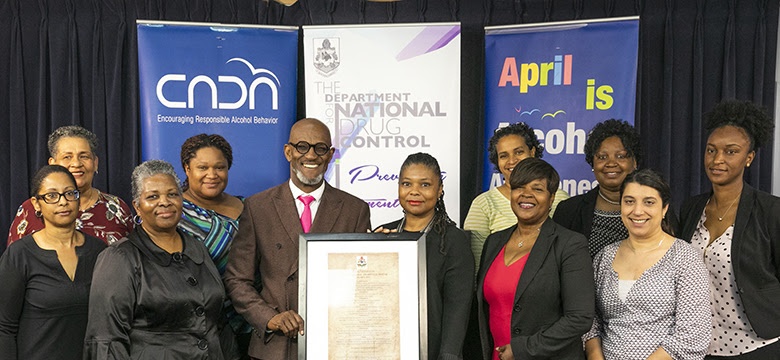
Remarks by the Attorney General and Minister of Legal Affairs, Senator the Hon. Kathy Lynn Simmons JP
Today, Bermuda joins the US National Council on Alcoholism and Drug Dependence, Inc. who have recognized April as Alcohol Awareness month for the past three decades (1987). This year’s theme, “Help for Today, Hope for Tomorrow”, speaks to educating people about the prevention and treatment of alcohol addiction, particularly amongst our youth, and the important role that parents can play in giving children a better understanding of the impact that alcohol can have on their lives. Evidence regarding alcohol use from the US National Institute of Health is very clear:
“Drinking too much alcohol can take a heavy toll, not only on a person’s health but also on his or her family relationships and work or school performance. Alcohol consumption can lead to alcohol dependence and abuse, contribute to a number of diseases and mental and behavioral disorders, and may lead to a range of injuries.”
Reports from Bermuda’s Department of National Drug Control 2015 National School Survey, which monitors the prevalence of alcohol, tobacco and other drug use among our young people, revealed that the lifetime prevalence of alcohol use for students from years M2 through to S4 is 52.6% - just over half of our students. What does lifetime prevalence of alcohol use mean? It means those individuals who had reported that they had used alcohol, at least once, in their lifetime. 52% of our students had reported that they had used alcohol in their lifetime. The majority (36.6%) of lifetime users of alcohol, have reported recent use of alcohol which means use in the past 12 months. The survey also revealed that current use of alcohol was most prevalent among older students, with M2 (age 12) students representing 49% and S4 (age 17) students representing a high of 53%. Further, it was reported that 1 in 5 students (21%) had been asked to buy or use alcohol in 2015. These results are very concerning as alcohol use and abuse remains one of the greatest challenges facing Bermuda’s youth.
Alcohol use by young people can be extremely dangerous. The Centre for Disease Control in the USA reported that of all the alcohol consumed by young people between the ages of 12-20 years, more than 90% of it is consumed through binge drinking. Binge drinkers are at risk for alcohol overdose and/or poisoning, vehicle accidents and unsafe sexual behaviours.
Parents are the most important role models in their children’s lives. What parents say and do about drugs and alcohol does matter when it comes to the choices their children will make.
Parents are urged to have those conversations with their children:
- Set a positive example and get involved in your children’s lives
- Get involved in their activities, know their friends and know where they are going and what they are doing
- Create clear, consistent expectations and enforce them
- Talk early and often about drugs and alcohol
- Discuss the consequences of drug and alcohol use
- Show you care enormously about what choices your children make about drugs and alcohol.
During the month of April, the Department of National Drug Control Drug Prevention Unit will be hosting community education activities at sporting events and at the senior school level to create awareness and encourage our community to get educated about the harms associated with alcohol and to seek assistance for alcohol related problems. The Drug Prevention Unit also plans to conduct the National School Survey 2019 of Middle and Senior Schools on Alcohol, Tobacco, Other Drugs and Health in the latter part of this year.
The Ministry of Legal Affairs, takes this opportunity to thank prevention organizations such as CADA and PRIDE who have been consistently disseminating prevention messages about the dangers of alcohol consumption and would like the public to know that the Department for National Drug Control has the resources necessary to help parents to begin the conversation with their children about drugs and alcohol.
